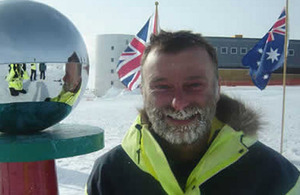Saracens players learn from the experiences of Royal Air Force adventurers
The Royal Air Force Rugby Union recently played host to 12 members of the Saracens squad at RAF Halton near Wendover in Buckinghamshire.

Warrant Officer Al Sylvester on his recent expedition to Antarctica [Picture: Crown Copyright/MOD 2012]
The Saracens Personal Development Programme, under the management of Dr David Priestley, Head of Psychology and Personal Development, provides the players with exposure to different situations and the opportunity to meet inspirational people from different walks of life so they can learn from their experiences.
Warrant Officer Al Sylvester delivered a fascinating briefing about his recent expedition to Antarctica. He planned, organised and led the first military attempt to reach the South Pole unsupported almost exactly 100 years after the famous Scott of the Antarctic expedition.
WO Sylvester’s stories gripped the Saracens players as he described the training regimes and selection processes he developed to choose the final four mountaineers who would walk nearly 1,000 miles (1,600km) to the bottom of the world.
The tale was one of excitement, danger, fear and perseverance when faced with near unconquerable obstacles.
Dr Priestley said:
This was a great opportunity for the young players of Saracens to understand how mental strength is as powerful as physical strength, especially when facing adversities.
Al Sylvester’s experiences on the way to the South Pole emphasised characteristics such as pride, loyalty, teamwork, leadership, integrity, courage, commitment and professionalism; the same values we seek to develop in our players through the Player Development Programme.

The Saracens rugby players visited the trenches built at RAF Halton to train soldiers to fight in the First World War [Picture: Crown Copyright/MOD 2012]
Although the team did not manage to reach the South Pole due to a near fatal injury to one of the adventurers, WO Sylvester’s story was inspirational and provided food for thought for the players who were able to recognise the emotional power required to continue when everything appears to be against you:
It was an opportunity to share experiences and discuss how sometimes the battles are mental as well as physical, whether on the ice or the pitch. The parallels between rugby and mountaineering are clear,” WO Sylvester said.
The Saracens players clearly understood that, in a team sport, an individual’s actions, positive or negative, big or small, can have a disproportionate impact on the team’s performance,” he added.
The players later visited the First World War trenches built at RAF Halton to train soldiers before deploying to fight. Flight Lieutenant Andy Claesens provided an insight into the harsh conditions experienced by these young soldiers and the hardships of living and fighting in such conditions.
Drawn from Kent, Buckinghamshire, Berkshire and Bedfordshire, and aged between 16 and 21 years old, these young men fought side-by-side, with the bonds of friendship and their cap badge:
The parallels with rugby are clear,” said the Saracens’ Jared Saunders. “The guys who stood in these trenches almost 100 years ago were all about our age and came from the same areas that Saracens recruit.
They had a sense of pride in their cap badge and would do anything for their units and friends. We feel the same about the Saracens badge on our shirts.
The day was organised by Wing Commander Nick Robson who summed the visit up by identifying how members of the Armed Forces work hard together, both physically and mentally, to overcome hurdles, whether deployed on operations overseas or back in the UK:
The Royal Air Force are proud of our association with Saracens and continue to find opportunities to build on this relationship,” he said.